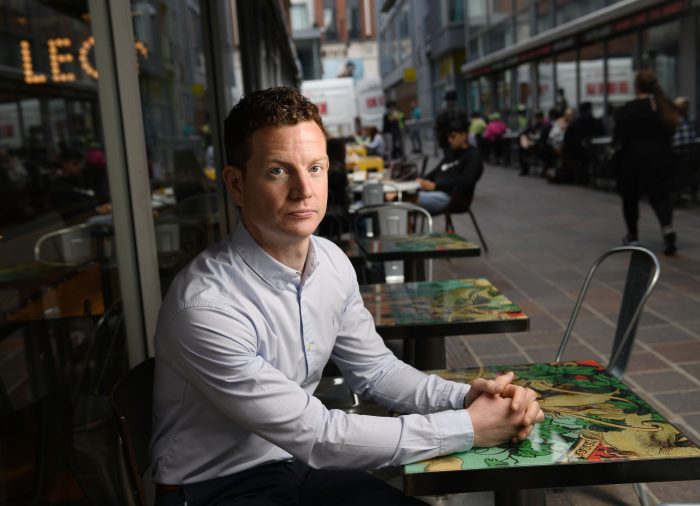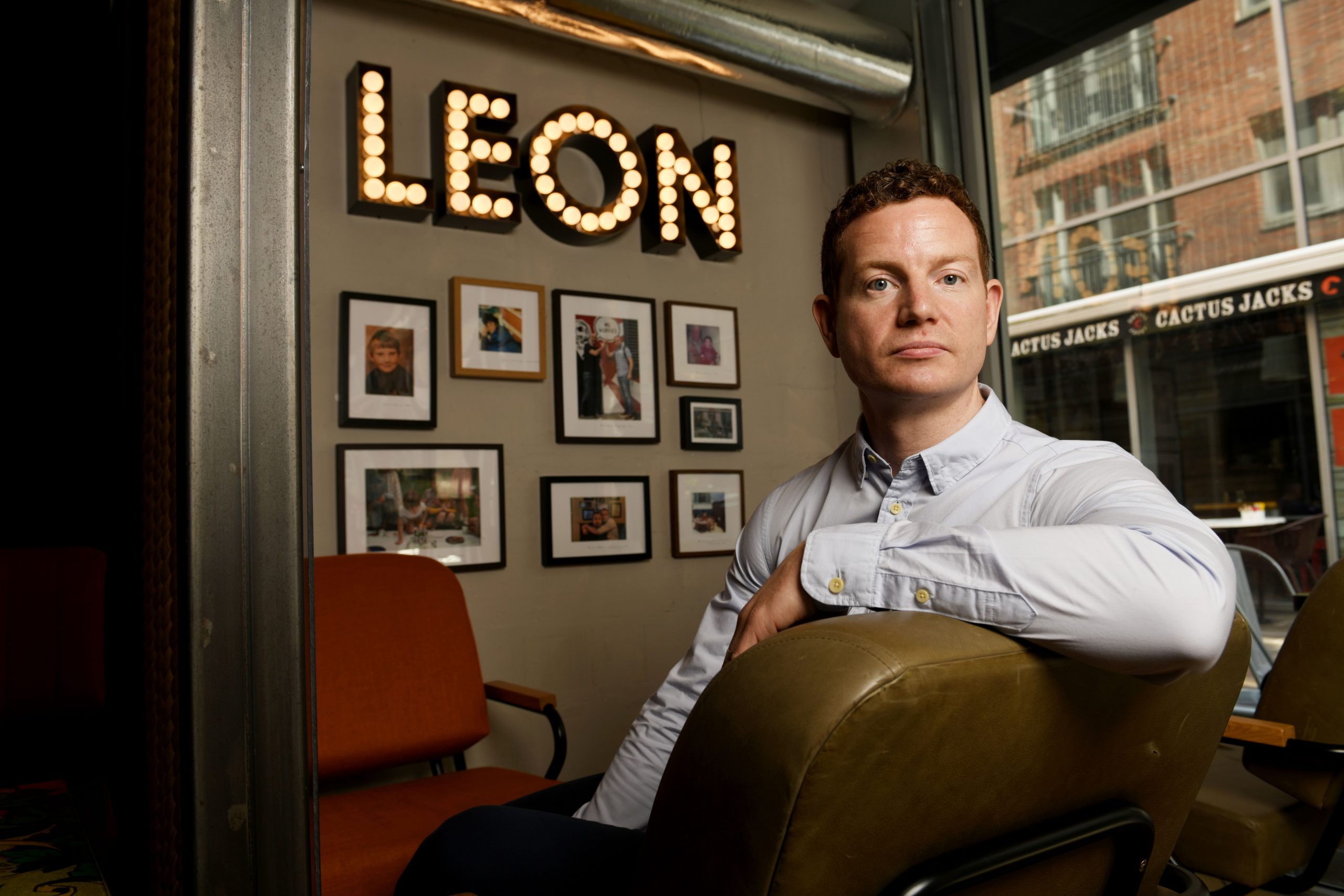Managing director of fast-food chain Leon, Stuart Fitzgerald, has been battling the effects of the pandemic on the hospitality sector for the last 15 months. But, during the call for this interview, the sound of pots banging and the hustle of bustle of a busy kitchen could be heard in the background. He was in the Leon restaurant on Millenium Walkway in Dublin, which sounded very much alive.
“The business has ramped up significantly since outdoor dining was reintroduced. The good weather helps of course,” said Fitzgerald.
The international healthy fast-food chain has two restaurants in Dublin, one on Millennium Walkway and one in Temple Bar. The one on Millenium Walkway has remained open while the other has been temporarily shuttered due to the pandemic.
“There’s just not enough footfall, volume, demand in the city centre for both locations at the moment. So it’s going to take time,” said Fitzgerald.
As Leon is a fast-food restaurant, the business is not using bookings, something he says has turned out to be useful.
“I know from speaking to peers that in some cases, guests have been block-booking restaurants with a view to not taking some of the bookings. People need to understand the impact that has on the hospitality business. To get a last-minute cancellation on a full-service restaurant, after the last few months those businesses have had, is just an extremely cruel blow. You don’t get a chance to resell that table,” he said.
*****
The vaccine rollout has brought hope for businesses, especially those in hospitality, which have suffered the most during the pandemic. However, the Government this week approved the resumption of indoor hospitality for people who present evidence of vaccination or immunity and children accompanying them. For Fitzgerald, however, the crisis has shown how different sectors can be impacted.
“This crisis has been deep and painful for certain sectors, but then for other sectors, there’s been no impact whatsoever. I don’t think a broad-brush approach is going to solve the issue. Policymakers need to focus in on sectors that really require support, and be strategic and be creative in terms of developing solutions to bring those sectors back to life,” said Fitzgerald.
Fitzgerald believes that putting plans around reviving the Irish businesses with the most scars from the pandemic will create huge dividends in terms of employment increases and the improvement of Irish tourism once travel returns.
However, Fitzgerald is yet to see a concentrated plan by the government to help hospitality through this crisis. Fitzgerald does believe some decent supports have been put in place for some businesses over lockdown. Yet he said a “broad-brush” approach has been used by the government, in comparison to how others have handled this crisis.

“I think in the UK, the hospitality-specific supports have been much better, much more targeted, and much more effective. The ‘eat out to help out’ scheme has been very good, the Vat reduction has been much more ambitious I think it’s fair to say. I think a lot of the supports that have been provided in Ireland like the EWSS, all of that has been really, really, really beneficial and really helps support businesses that are struggling,” said Fitzgerald.
“I do think that the hospitality sector is a special space, and I do think it’s going to need creative thinking from the government. I do think that a lot has been done but, in fairness, more can be done. The hospitality sector was a massive employer across the country. It’s a massive part of the Irish experience for foreign travellers coming into the country, for holidaymakers coming into the country. It’s really important the government helps traders around the country to come out of this pandemic crisis and to get back to where they were.”
Restaurants were already facing challenges before Covid-19 landed in Ireland. With the sector already struggling, Fitzgerald was not alone when he said there needed to be more of a detailed plan for hospitality.
Last year, Fitzgerald spoke to The Currency and explained that to get restaurants through this crisis, the government needed to focus on the flexibility of the restaurant sector’s cost base, rather than individual issues it faces like rent. Just over a year on from this conversation, Fitzgerald states this has not happened.
“If you were to do a comparison of the ‘eat out to help out’ scheme in the UK versus the tax rebate scheme that was introduced in Ireland last summer, I think they were diametrically opposed both in their ambition and in terms of what they actually delivered for guests eating in restaurants again and for hospitality businesses,” said Fitzgerald.
This scheme created a huge windfall for hospitality businesses as it provided 50 per cent off the cost of food and/or non-alcoholic drinks eaten-in at participating businesses UK-wide. It applied all-day Monday to Wednesday and the discount was capped at a maximum of £10 per head. This scheme was linked to a number of Covid-19 clusters however.
Ireland did have a tax rebate scheme to get people eating out again, but Fitzgerald was not impressed.
“The Irish equivalent to the tax rebate scheme just didn’t deliver. I think it was too convoluted. Too complex. I don’t think consumers really responded to it and I don’t think it gave the stimulus the sector needed,” said Fitzgerald.
“It just got people out and engaging with restaurants again. I think people just need a bit of encouragement to get back out there again and to understand what they’re missing. We’ve all been locked up for 15 months and you forget about the benefits and the requirement for social interaction. And sometimes it’s easier to have food delivered to your door, but I think if there’s an incentive to get people out and enjoying food experiences again, I think that’s really important.
“Hospitality is a part of the fabric of our society. I think if it’s not supported then we’re going to lose something very special about the Irish experience.”
Acceleration of dark kitchens
The pandemic may have caused traditional hospitality to grind to a halt, but it has also accelerated the popularity of dark kitchens.
“Delivery only kitchens, dark kitchens, ghost kitchens, they were part of the market before the pandemic. Obviously, the pandemic has accelerated that massively. It’s accelerated a number of things and accelerated a lot of challenges, not least of which is in the kitchen space,” said Fitzgerald.
Dark kitchens operate takeaway services and do not have dine-in services available. Take-out became widely popular among restaurants leading many to open their own dark kitchen, and Leon is no exception. The chain opened its first dark kitchen in Stillorgan on June 24.

“It’s just a natural development of the food and beverage and hospitality market. I think it’s a different experience. And I think it’s hugely convenient for consumers and for guests, and the ability to have and enjoy restaurant-quality foods at their home or in a different location is appealing,” he said.
“But you do obviously miss something. You miss the buzz of the restaurant experience, the interaction with the team, the social element of it. So, I do think that delivery-only kitchens and dark kitchens are going to have a very important place in the market.”
Looking outside the city
For now, Leon has Leon restaurants and one dark kitchen, but Fitzgerald stated that the company is looking to expand the business and may announce more details later in the year. He did reveal though that these locations will most likely be outside of Dublin city.
“We’re focusing on getting our two units back to normal trading conditions and getting to the dark kitchen right. We are interested in further units in probably different channels than we’re currently operating in. So, I do think the city centres are going to be very difficult, hopefully only in the short term, but certainly for a period. But for us, I think suburban locations remain very interesting,” he said.
“The macro fundamentals of this business haven’t changed. People still need to be at eat. They still want healthy food. They still want service quickly. So, for us it’s about identifying where the people have migrated to and tailoring our offering to meet the demand in the locations where the people are currently situated,” said Fitzgerald.
This move from city to suburb comes as Fitzgerald believes the retail landscape will not return to what it was pre-pandemic.
“I think the high street is changing fundamentally. Students aren’t back, tourists aren’t back, office workers aren’t back. It’s going to take time to recover. And I think it’s going to be a very different landscape when it does recover. All stakeholders are going to have to appreciate that. Government, operators, landlords, consumers. I don’t think we’re going back to the world the way it was before,” said Fitzgerald.
Seeing it from both sides
Fitzgerald is also joint managing partner of charted accountant firm Fitzgerald Power, which he stated has been “at the other end of the spectrum”, during the pandemic. “With the two businesses that I operate, back to my previous point, it’s been deep and severe in some sectors like hospitality and then in a commercial Ireland, I think there hasn’t been a massive impact really at all,” he said.
“Fitzgerald Power has actually grown quite rapidly over the last 12 to 18 months. Covid-19 has been part of that because I think people are starting to realise that it’s difficult to manage in-house finance teams remotely and we’re seeing a lot of opportunities for outsourcing. So that business is growing very rapidly.”
Most of the client issues that Fitzgerald Power has worked on over the past year were on cash flow and stakeholder management.
“So, from our point of view, we would tell clients that effective stakeholder communication and management and engagement is really important. It’s really centred around non-essential retail businesses and hospitality businesses, because they’ve been the two parts of our client base that have had the deepest impact. As I say, other sectors, just not so much,” said Fitzgerald.
“So, dealing with banks and other lenders in a proactive way, not hiding from conversations, but being upfront. Like this isn’t a borrower delinquency issue. This is a systemic, international, once-in-a-lifetime pandemic. And I think all stakeholders have to work together.
“I think getting in front of it and engaging with banks and lenders and private equity funders and shareholders and landlords, because all of those businesses and I’ve had landlord relationships, I think just having an open dialogue with landlords and we’ve seen some landlords been really supportive and really understanding with landlords qualifications in their sights,” he added.


